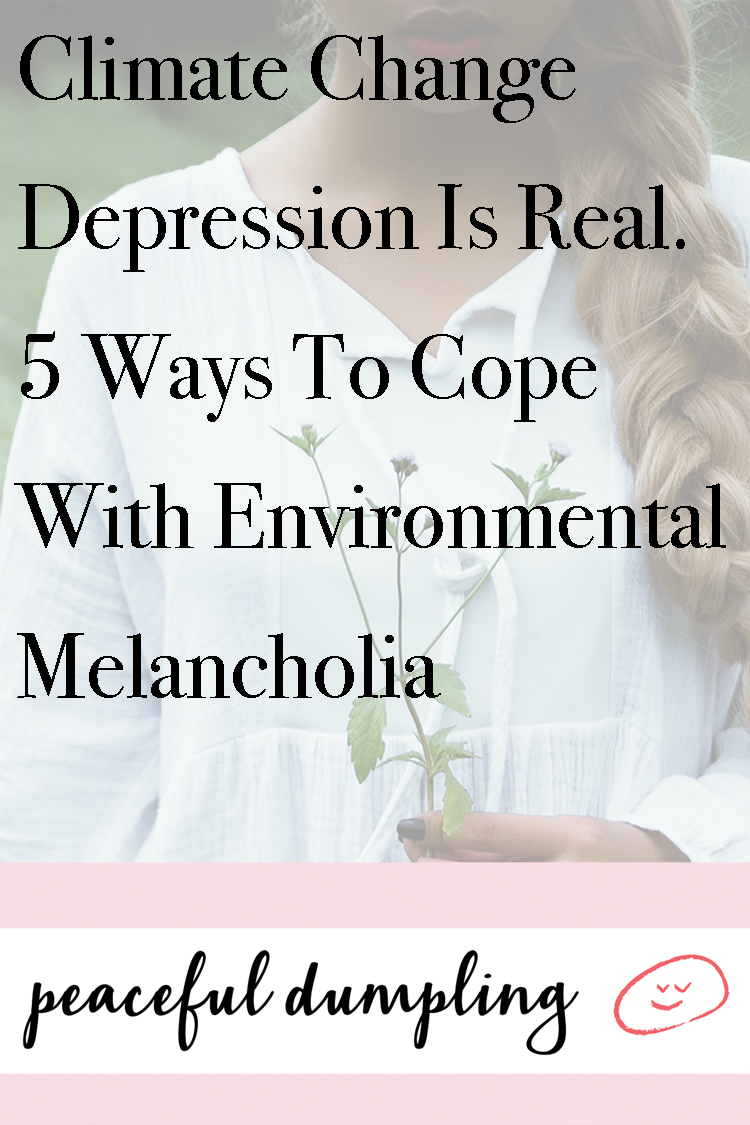In our current political climate, it can be hard to catch your breath (there is always something, no?), and when reading the morning’s headlines becomes a real test of morale, staying optimistic can feel further and further from reach. Our mental burden is further compounded by mounting evidence that climate disaster is worsening and the predictions about the coming decades are beyond worrisome, as the UN confirms. It’s enough to send one into a depression—and, in fact, it often does.
Recent research has confirmed what many of us have felt to be true: climate change is linked to worsened mental health. In my own case, climate depression (or environmental melancholia) feels like a heavy, wet blanket is smothering me; when I think about global warming, my breathing becomes shallow, and my earth-friendly efforts feel somewhat pointless.
I know I’m not alone in this feeling. Friends have expressed similar struggles, and despite the disparity between awareness of climate change in our country and the reality of it, there’s just something in the air bringing us down with all the carbon and other junk.
With that in mind, I’ve been considering ways to cope with climate change depression in addition to fighting climate change itself—and there’s definitely overlap between the two. Here’s what I think may help.

Continue your environmental efforts and commit to additional ones where possible.
Keep making as many earth-friendly decisions as possible. Even the small ones make a difference. Last Earth Day, I committed to no longer stocking my pantry with individually packaged granola bars. Now, I make my own bars or pack a snack in a reusable container. It’s a small change, but these things do add up. Other ideas to consider include going vegan (a bigger change, but one that’s well worth it!), switching to green energy in your home (it’s easier than you may think!), reducing plastic consumption, and a host of other actions. Bad news rarely feels empowering, but our response to it can be.
Along those lines, try to court optimism when possible. I believe that it’s vital to mourn and sit with your anger and grief when it visits—we can’t be positive 100% of the time. And that’s okay. But if you care about something enough to feel devastated when it’s threatened, then it’s worth believing in and fighting for rather than letting the sense of “what’s the point” take over.
Talk to others about how you feel.
While it’s true that not everyone feels the same way about climate change, a trusted listener can still help you process your feelings. My husband and I come to the issue from different perspectives, but we can still help pick each other up—and we’ve learned a great deal from one another on this issue. I’ve successfully converted him to reusable grocery and produce bags (woot!), and he’s informed me about some out-there but very intriguing initiatives.
Praise and encourage others for their environmental efforts.
The more we remind each other that we’re all in this together, the less lonesome our seemingly little efforts will feel. I recall going out to the compost with my husband after the 2016 election (not normally a group effort, but for some reason we went together), and the act felt almost mournful, but the more people I talked to about making choices in our own backyards, so to speak, the less I felt like my endeavors were lost to a void. To this end, let’s also be kind and attract people into our movement rather than shame them into it. We need all the positive momentum we can muster.
Take a break.
Some time away from thinking about the problems of the world can be restorative. It bears acknowledging that not everyone has this luxury, but if we can engage in self-care and mental rest, I believe it allows us to be more effective in our more important endeavors. Actually, research confirms it.
Part of taking a break is allowing yourself to live in the moment. For me, climate depression manifests as stark visions of the future, many of which may not even be realistic. It’s soothing to appreciate the Now—including all of the earthly beauty we still have as well as mundane moments: laughs with friends, a good meal…
Of course, there is a difference between taking a break from working your mind over an issue and pushing that issue away or ignoring your feelings about it. I’ve struggled to find my own balance and continually have to tune out the siren song of denial (sometimes I catch myself trying to pretend that I’m not sad about our situation). Interestingly enough, authentic self-care gives me more power to find balance.
Confront your anxiety about death.
I know, I know, but hear me out. This one is tricky to explain because I’m personally not someone who has made perfect peace with her own death and especially not that of her loved ones. (You all better rage, rage against the dying of the light, do you hear me?!) Moreover, I am not recommending that we make peace with the looming demise of nature and humanity as we know it. I do not, to be very clear, think we should shrug our shoulders and go out with a bang.
However, in my own case, it has been productive to realize that my climate panic is related to an existential dread that’s both personal and general. i.e., I worry about my daughter, and I worry about everyone and everything in nature. Turning my awareness to this is not pleasant, of course, but simply naming the feelings for what they really are is an important starting place as well as an end in itself.
When I face these feelings, I’m reminded that a part of my anxiety stems from having very little control—over my government, over the actions of others, over the future, and even over some of my own needs. I’m not saying that our individual efforts don’t make a difference (I believe they do!)—but it’s impossible to know what that difference will amount to, especially in a sea of other variables.
The point of this exercise is not to “feel more okay” about climate change or death—or to even find actionable solutions. It’s simply about situating hard feelings and acknowledging them to yourself. It’s about being honest. At the very least, it prepares us to more deeply connect with others who are going through something similar. And that really means a lot.

Do you experience climate change depression? How do you cope?
Related: Will We Be Able To Travel On A Hotter Earth? How Climate Change Is Disrupting Tourism
Exactly How To Inspire Others To Fight Climate Change (In *The* Sweetest Way)
PSA: One Super Simple Way You Can Fight Climate Change & Desertification At Your Desk
Get more like this—Subscribe to our daily inspirational newsletter for exclusive content!
__
Photo: Anthony Tran on Unsplash




